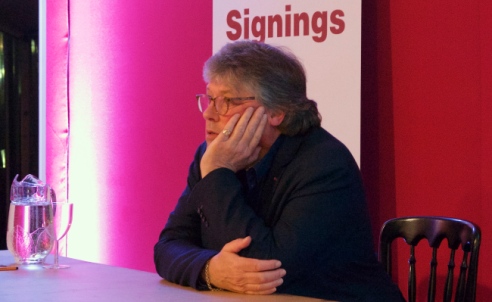Given the musical preferences of Rebus it’s no surprise that Ian Rankin chose to talk to Richard Havers when asked to select some events for the book festival. Havers’ two most recent books focus on the American Jazz labels Blue Note and Verve.
They begin by discussing the fact that Jazz was essentially the Rock n Roll of its day. It played in all the clubs and it played on Juke boxes and there was an area of New Orleans that the Navy tried to shut down, thanks to sailors pouring into brothels to listen to the jazz musicians playing there. Duke Ellington is quoted as having said “Jazz has always been the kind of man you wouldn’t want your daughter to associate with.” The music had chemistry and it was well loved.
When Alfred Lion set up Blue Note records he had the aim of always recording good music without compromising the artist’s expression. He kept a note to that effect on his desk and the label now has quite an extraordinary history. There is a great deal of original music on Blue Note records compared to other jazz labels, largely because Lion would pay for two days of rehearsal and one for recording. The artists had time to play and rehearse new things. Blue Note was lucky in being able to work with Rudy Van Gelder, a recording engineer who was extremely talented at producing records that sounded as close to a live performance as possible. Lion had also paid for Francis Wolff to leave Germany after the war had begun and Wolff went on to create the defining style of Jazz photography.
When discussion moves on to Verve, Havers mentions Norman Granz and his Jazz at the Philharmonic concerts. Granz was the first to take Jazz out of the clubs and bring it into concert halls. His concerts featured many of the best musicians from the time and when the concerts went on tour Granz made a point of only booking concert halls that did not have segregated audiences. He also created the way people tour now by sending someone ahead to do deals with local radio stations to promote their upcoming concerts.
There were times when both labels got into financial difficulty, as record labels often do, and Havers explains that often they would record someone they knew would sell well so that they could then record the albums they thought important or interesting. Blue Note might finally have gone under in 2001 if it hadn’t been for the success of Norah Jones. That seems to be the story of several labels; they creep close to death, find a new hit artist and then make enough money to keep going.
When asked about the current state of Jazz, Havers is largely positive. He feels that many Jazz festivals are not really Jazz at all, in part because they do the same as the labels and book someone who will bring in ticket sales first. However Jazz can be found at these festivals and there is a younger audience coming in. Rankin points out that vinyl is making a come back and Havers agrees. Jazz, he says, is in good health.

Leave a Reply